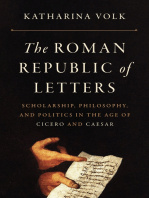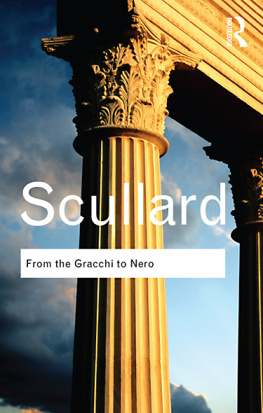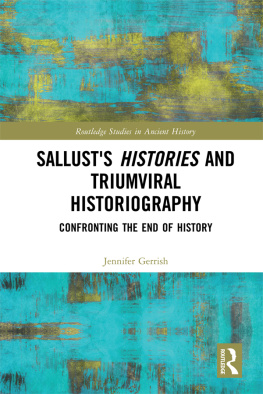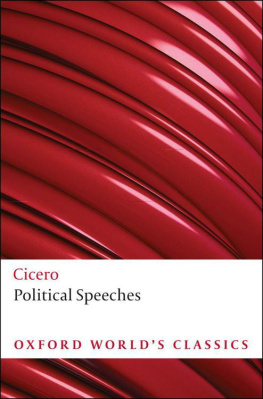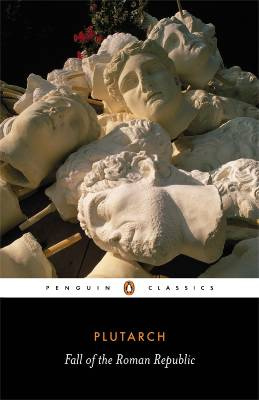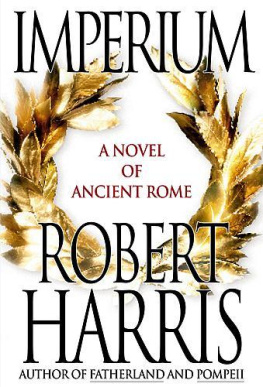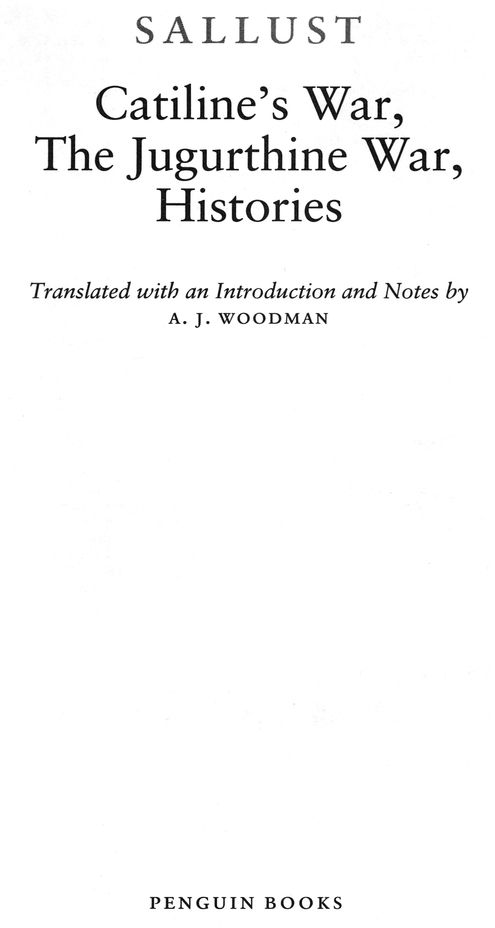Table of Contents
CATILINES WAR, THE JUGURTHINE WAR, HISTORIES
GAIUS SALLUSTIUS CRISPUS (86-?35 BC) was born in the Sabine highlands of central Italy. In 52 he became tribune of the plebs but two years later he was expelled from the senate for alleged immorality. Rehabilitated through the influence of Julius Caesar, whom he served in the civil war which broke out in 49, he became praetor in 46 and was installed by Caesar as governor of Africa Nova. Sallust is said to have enriched himself so blatantly at the expense of the province that it was only through Caesars protection (possibly secured by an enormous bribe) that he was saved from a second condemnation. He used his wealth to acquire a mansion and parkland at Rome, the famous Horti Sallustiani, later the property of the Roman emperors.
After Caesars death in 44 Sallust retired from public life and turned to the writing of history. His monographs on the conspiracy of Catiline and the Jugurthine War, written in the late 40s, both survive intact; his Histories, covering the post-Sullan period from 78 onwards, survive only in fragments. His literary achievement was such that he became one of the most influential and popular historians in antiquity and beyond.
A. J. WOODMAN is Basil L. Gildersleeve Professor of Classics at the University of Virginia. He has published numerous books on the interpretation of Latin literature, especially in the fields of Augustan poetry and early imperial historical writing: his Rhetoric in Classical Historiography helped to transform our understanding of how the ancient historians wrote history. He has co-authored commentaries on Books 3 and 4 of Tacitus Annals, and a monograph Latin Historians. Most recently he has produced Tacitus Reviewed, co-edited Traditions and Contexts in the Poetry of Horace and published an award-winning translation of Tacitus Annals.
PENGUIN CLASSICS
Published by the Penguin Group
Penguin Books Ltd, 80 Strand, London WC2R ORL, England
Penguin Group (USA) Inc., 375 Hudson Street, New York, New York 10014, USA
Penguin Group (Canada), 90 Eglinton Avenue East, Suite 700, Toronto, Ontario, Canada M4P 2Y3
(a division of Pearson Penguin Canada Inc.)
Penguin Ireland, 25 St Stephens Green, Dublin 2, Ireland
(a division of Penguin Books Ltd)
Penguin Group (Australia), 250 Camberwell Road, Camberwell, Victoria 3124, Australia
(a division of Pearson Australia Group Pty Ltd)
Penguin Books India Pvt Ltd, 11 Community Centre, Panchsheel Park, New Delhi- 110 017, India
Penguin Group (NZ), 67 Apollo Drive, Rosedale, North Shore 0632, New Zealand
(a division of Pearson New Zealand Ltd)
Penguin Books (South Africa) (Pty) Ltd, 24 Sturdee Avenue, Rosebank, Johannesburg 2196, South Africa
Penguin Books Ltd, Registered Offices: 80 Strand, London WC2R ORL, England
www.penguin.com
Published in Penguin Books 2007 4
Translation, Introduction and Notes copyright A. J. Woodman, 2007
All rights reserved
The moral right of the editor has been asserted
Set in 10.25/12.25 pt PostScript Adobe Sabon
Typeset by Rowland Phototypesetting Ltd, Bury St Edmunds, Suffolk
eISBN : 978-1-101-16058-9
www.greenpenguin.co.uk
Penguin Books is committed to a sustainable future for our business, our readers and our planet. The book in your hands is made from paper certified by the Forest Stewardship Council.
http://us.penguingroup.com
Preface
Of course there is nothing inherently superior about a translation which is made directly from the original language. These words were written very recently by a distinguished Professor of Classics at Oxford. To illustrate his point he referred to a celebrated twentieth-century poet whose ignorance of their original languages never inhibited him from translating poets who wrote in Russian, Czech, Hungarian, Serbo-Croat, German, Spanish or Portuguese. Some readers may wonder how one can translate a language without knowing it; but the answer appears to be that such translators simply rewrite in their own words one or more of the English translations which are already available. This is not a doctrine or a practice to which I subscribe: whatever the resulting product of such a process may be, it is not a translation, and to pretend otherwise is simply to collude in the fraudulent misuse of language which now corrupts every aspect of modern life. Readers of this new translation of Sallust may like to know from the start that it is indeed made directly from the original language.
In the middle of the last century, when it was taken for granted that classical scholars would know Latin and Greek and that a degree in Classics would involve the study of the classical languages, the general fashion was to translate classical texts into a modern and readable English idiom. But times and fashions change. Contemporary readers of translated classical texts are more diverse than forty or fifty years ago, and their requirements are different. In those days it was no doubt acceptable for a translator to memorize half a page of a Greek or Latin text and then to produce a fluent, if not necessarily exact, English translation from memory. At least one Penguin Classic was indeed produced in this way. But those who study classical civilization or ancient history at university, and who know no ancient language, constitute a significant proportion of those who now read translated classical texts, and they require a more scholarly and accurate product than is possible by this eccentric method. I have kept these potential readers firmly in mind, while not, I hope, alienating those who simply desire to read about some of the more famous episodes of Roman republican history as narrated by the first Roman historian of whom complete works have survived.
My translation of Sallust keeps closer to the original Latin than do the other translations which are currently available. I have gone some way in attempting to reproduce Sallusts word order and sentence structure, in the hope that readers will get at least some idea of the feel of the original Latin; and as a general rule I have tried to avoid producing an edited translation, relegating explanatory matter to endnotes. Nevertheless, whenever adherence to Sallusts Latin seemed incompatible with readability, I usually decided in favour of the latter.
I am extremely grateful to those whom I have consulted on individual points or who have kindly agreed to offer me comments or suggestions on the Introduction or translation or both: P. J. E. Kershaw, C. S. Kraus, C. B. Krebs, J. F. Lazenby, J. E. Lendon, D. S. Levene, D. P. Nelis, J. J. Paterson, C. B. R. Pelling, Z. Stamatopoulou and T. P. Wiseman. I owe an especial debt of gratitude to Robin Seager, who is certainly not to be blamed for any errors that may remain. But my greatest debt, as usual, is to Ronald Martin, who has subjected the entire book to his critical gaze and provided me with copious corrections and observations.
If readers detect any mistakes or misconceptions, especially in the translation, I hope most sincerely that they will bring them to my attention.
Abbreviations and References



